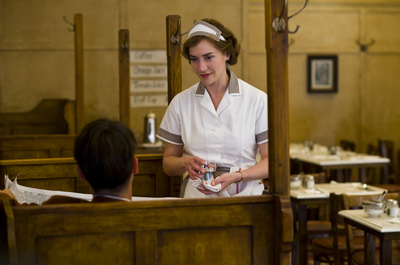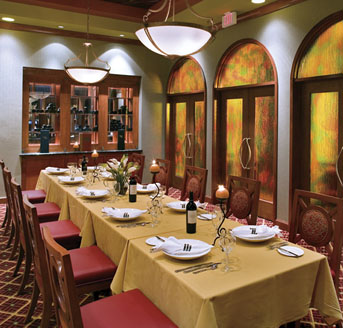Listen: Play in new window | Download
Merritt Tierce is most recently the author of Love Me Back, a lively and fierce debut novel about a young single mother who works as a waitress and disguises her pain and humiliation behind a smile. Love Me Back was published by Doubleday.
This book is one of those rare works of art possessed with the boldness and the decency to tell the complicated truth about how women are doomed to second-class treatment in our precarious economy. It is a welcome and candid corrective to such loathsome television shows as 2 Broke Girls that prefer to prop up a sexist fantasy and outright myths rather than contend with blue-collar life. The distinction between Love Me Back‘s art and 2 Broke Girls‘s awfulness worked our production team up so much that this episode’s introduction contains a strong critique of 2 Broke Girls‘s sexist treatment of its characters and how it has influenced the perception of waitresses in American culture.
Our conversation with Ms. Tierce begins at the 4:57 mark. In our conversation with Ms. Tierce, there is also a remarkable gaffe, indeed one of the most notable flubs in our program’s long history, that involves a mangled pronoun. Apparently, Our Correspondent was so won over by Tierce’s narrative that he made the mistake of believing that the character Danny said something worse than he did in the text.
Author: Merritt Tierce
Subjects Discussed: The American novel and people who work in restaurants, James M. Cain’s Mildred Pierce, Stewart O’Nan’s Last Night at the Lobster, Mimi Pond’s Over Easy, working in a high-end steakhouse, how restaurants distort the physical form, cutting, self-harm, comparing the early version of “Suck It” to the book’s version, keeping text the same over a seven year period, the first full story that Tierce ever wrote, knowing that Love Me Back was a book, Alexander Maksik’s input into Love Me Back, approaching a book without knowing it was a novel or a short story collections, the commercial stigma against short story collections, interstitial pieces linking the stories, creating sentences that are more final than final, stripping italics and punctuation from the original stories, the fictionalized essay Tierce wrote for Pank, style and plummeting attention spans in the digital age, circumstances in which we see punctuation marks in life, why Tierce can’t add anything artificial to her writing, the sense of time related to life waiting tables, Tierce being accused of “petty rebellion” by a professor, women being defined exclusively in roles of pain, Leslie Jamison’s “Grand Unified Theory of Female Pain,” women as second-class beings, the difficulty of writing happiness, what happens when you read too much Thomas Hardy, Edward P. Jones, Marie’s small size and her epicene identity, the ostensible fluidity of gender, vulnerability, Victoria Patterson’s LARB essay on Love Me Back, the ineluctably damaging qualities of the male gaze, when rebellion and degradation align, personal responsibility in being exploited, Tierce sharing biographical details with Marie, Tierce’s short story “Solitaire,” “This is What an Abortion Looks Like,” imagination and personal experience, the conversational stigma about abortion as a very regular part in American life, Wendy Davis, Obvious Child, and acceptance of same-sex marriage vs. acceptance of abortion.
EXCERPT FROM SHOW:
Correspondent: Before we get into what this novel has to say about class, about self-abuse, and about being a woman, I’d like to get into the American novel’s often neglected history about people who work in restaurants. I think of James M. Cain’s Mildred Pierce and I figured you were familiar with that given the cognates in your name. And I also think about Stewart O’Nan’s Last Night at the Lobster. I think about Mimi Pond’s graphic novel, Over Easy, which is somewhere between a memoir and fiction. To what extent was your novel a response to this often neglected form of novel? And given that there are an estimated 2.4 million* waiters and waitresses in this country, why do you think that this very real life has been so underrepresented in literature?
Tierce: That’s a great question and I’m really impressed at that list that you just provided. Because a lot of people have asked me, “Why haven’t I read anything about restaurant life?” And I am familiar with Mildred Pierce only because of the HBO miniseries.
 Correspondent: Oh, the Todd Haynes.
Correspondent: Oh, the Todd Haynes.
Tierce: With Kate Winslet. And it’s fantastic.
Correspondent: And has a great dramatization of restaurant life as well.
Tierce: Yes! It does. And there’s some similar themes at work, I think, in Mildred Pierce and in my book. And I’m also glad to hear that number. 2.4 million. Because it seems like so many people have worked in restaurants or even in some other form of retail or customer service.
Correspondent: That’s just waiters and waitresses. I pulled that from the Bureau of Labor Statistics. Because I really wanted to know that number too.
Tierce: Okay. Cool. Yeah. It’s something that so many people are familiar with and I’m surprised there’s not more writing about it. But one of my theories is that it’s really hard work. And a lot of times it’s just a means to whatever real end you’re going for in your life. And I say “real” because I don’t want to diminish anyone’s work in restaurants. I worked in restaurants for fifteen years. And it was very much my real life.
Correspondent: When did you stop working at restaurants? I know that the New Stories from the South bio says that you were working in a high-end steakhouse at that time. And I was curious about when that tapered off.
Tierce: Yeah, I was. And it tapered off about two and a half years ago. So it’s fairly recent. I mean, it’s so recent that I still frequently wake up and have a moment where I’m grateful that I don’t have to go work in a restaurant tonight.
Correspondent: Wow. What kept you in that? And it seems to me there’s an almost addictive impulse to it that you tap into very well with this novel.
Tierce: I mean, I couldn’t make more money doing anything else. So there was that reality. And I have two kids. And I’ve had them since I was Marie’s age myself. So it was hard for me to simultaneously make a living and try to get advanced in any other arena of life. And I think that is why a lot of artists especially keep working in restaurants. Because you have some flexibility and you have a steady cash income usually, which is enough to keep you going. But then you do get caught in it. And it’s hard to get out. And that goes back to what I think about why it’s not written about. It’s because when you do break out of it, it’s such a relief. You don’t want to think about it one more second of your life. Especially not to write.
Correspondent: Well, I think what it is — and I had a stint working in restaurants a long time ago — but it’s this kind of illusion that you’re free. Because I can always drop the job if I get a gig. And then you get caught up in a similar cycle that has no job security whatsoever. And I guess there’s so much shame attached that we don’t want to analyze it — whether it be in literature or even in life or even in regular conversation.
Tierce: Right. Yeah. You know, that’s an unfortunate reality of life — in particular, in America. The service industry is so condescended to and looked down on. You know, it’s not thought of as worthwhile work.
Correspondent: Or if it is, it’s some kind of vibrant, effervescent comedy or something.
Tierce: Right.
Correspondent: As opposed to the realities, the darkness. The physicality, which you get into very well in this book. Well, we don’t actually learn Marie’s name until a few chapters in. And this seems to reflect this regrettable cultural tendency in which customers, even the most progressive-minded ones, will often go into a restaurant and not even remember the name or not even see anything of the waiter or the waitress other than a physical blur And that opening section where it’s just this extraordinary sense of physical seizure is astonishing. But throughout the book, there’s a lot of physicality. And we become very aware of the physical presence of the waitstaff in this book through much of the sexualized scenes and so forth. I think also however of Tayna’s thumb resembling soggy bread. You have the “warm buttery smell” of Carl’s neck. These characters all seem to physically blend into the restaurants. And not even the seemingly protective plush leather of the check presenter is safe. There’s that credit card scene, where it actually gets lodged into the restaurant. And I’m wondering. What is it about the physical allure or the pull of a restaurant? I mean, this seems to me just as much of a part of it in both your novel and in life. It’s almost this vortex to a certain degree. And I’m wondering how you arrived at that or if you arrived at that or what physicality really means when both waitress and customer go to a restaurant.
Tierce: Right. Well, it is such a basic act. Eating and bringing someone food. And it is the most basic maintenance of the physical. So there’s that kind of level to it. But as a writer, I’m most interested in the sensual. Whatever details there are to be observed in a situation, the sensate ones are the most important to me. And a restaurant is, I think, a more fertile territory for that than a lot of settings because of the food and the smells and the sounds and the people and the touching, the everything of it.
Correspondent: Do you feel that much of the sex in this book — where did this come from? Did this come out of an investigation of the restaurant as physical consumptive space? Not just from experience. I mean, it just seems to become more of this great pull on all the characters. Not just Marie. Although in Marie’s case, it becomes just utterly painful to read and to see what she’s going through. Was sense of space one of the ways that you were able to triangulate her pain and the way that she dealt with it in her life as she get dragged further into this trajectory?
Tierce: Well, I wish I was smart enough to have been that deliberate about it.
Correspondent: Well, instinctively, how did it come?
Tierce: Yeah. Instinctively, it just was an element of restaurant culture that I do know from experience to be ubiquitous and to be just a part of the after hours life of a restaurant and the people who work there. I honestly don’t have a great answer for why that is or what the connection is. But I think it has partly to do with just appetites, with trying to satisfy other people’s appetites and putting yourself completely at the service of other people and then needing to get that back in some way. To convince yourself that you still exist by satisfying some of your own appetites after it’s over.
Correspondent: Being in service to other appetites creates a voracity of your own that is impossible to appease.
Tierce: Right. Exactly.
Correspondent: There are a few moments throughout Love Me Back where Marie subjects herself to self-harm, to cutting. The fondue skewer while her daughter is watching The Cosby Show. Cutting is typically associated with high school girls — at least, that’s how we look at it in society. But as we come to know more of Marie’s backstory in the short and long alternating chapters, we become very aware that Marie’s life has been thrown into this degrading trajectory because, well, she’s been thrown into the wilderness without a handbook. And I think you get at very well how, when we abandon kids or teenagers and throw them into the world, there are these lingering things. I mean, Marie has to learn much of this at the behest of men. And I’m wondering. Do restaurants contribute in any way to being in denial about throwing our kids into really terrible lives like this? And can fiction provide an adequate response to getting people to understand these gruesome but important truths?
Tierce: Maybe. I hope so. I don’t know. I don’t want my daughter to work in a restaurant anytime soon.
Correspondent: Did she ever actually say, when you were working at a restaurant, that she wanted to work in a restaurant just like Marie at all? Just out of curiosity.
Tierce: Yeah. Both my kids have said that when they were little. And it made my heart sink. But at the same time, I have to say that working in restaurants has given me some values and basic skills in life that I need and really treasure. And I wouldn’t give them back for anything.
Correspondent: Such as what exactly?
Tierce: Such as being aware of other people. I mean, when you’re forced to put other people’s needs and desires ahead of your own, no matter how you feel about them, it’s hard to kick that habit. And I’m not saying it makes you an altruistic person. I’m just saying that even on a physical level, when you’re walking down the street you have a different way of moving. You’re not oblivious to people. Because of working in restaurants. And you learn to, as Marie says, anticipate and to consolidate. And those are useful skills for life. And you learn to work really hard. And that alone is useful, I think. And now I’ve forgotten what your question was.
Correspondent: Well, we had a magical massive question of mine.
Tierce: (laughs)
Correspondent: I’m implying magic when it was probably just prolixness on my part. But essentially I was asking, “What is it about restaurants that could cause our kids to be subjected into this vortex?” We were talking about the notion of basically throwing our kids into situations that they’re ill-prepared for. And restaurants almost pick them up where colleges or institutions or libraries or other things, which could in fact help them and prepare them more adequately. I mean, it’s almost like having soldiers go into war to a certain degree.
Tierce: Yeah. I mean, I don’t know. It’s sort of inevitable, especially now. It seems harder and harder for young people to get meaningful work, to get any job at all. And people will always need to eat. So restaurant work will always be available. And if that’s the only place you can launch yourself from, that’s, I think, our fault for not making more meaningful work more available and not making college, for example, more affordable. And I say that as someone who’s still paying down student loans myself and has basically no money saved for college for any of the three children who live in my house. And I value education more than almost anything. But there are some real factors at work as to whether or not any given person can get a higher education.
Correspondent: How does writing help you to come to grips with these particular realities that, I think, all of us face to a certain degree?
Tierce: Well, writing helps me come to grips with all of reality. Just because I don’t really know what I think or how I’ve gotten to what I think until I start writing about it, which I’m borrowing straight from Flannery O’Connor. I think that’s something that she said, but it makes so much sense to me. That’s just how my mind works. I reveal myself to myself through writing.
(Loops for this program provided by nosleeves, ShortBusMusic, kingADZ12, danke, doudei, 40A, leoSMG, ebaby8119, and gutmo.)
The Bat Segundo Show #551: Merritt Tierce (Download MP3)
This text will be replaced
* — Please note that, on air, our correspondent stated that the Bureau of Labor Statistics reported 2.5 million waiters and waitresses in America. The correct number is 2.4 million and the excerpt text has been corrected to reflect the correct number, which is also stated correctly in this episode’s introduction.



